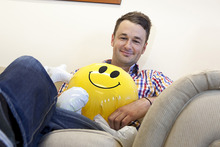Re: PM Lee: We cannot just measure our success by GDP growth. Enlightened or Just Way
People enjoy sex, dislike Facebook - study
8:49 AM Monday Nov 12, 2012
University of Canterbury postgraduate psychology researcher Carsten Grimm has been researching the happiness levels of various activities. Photo / Supplied
Having sex and partying are two of life's most enjoyable activities, according to a University of Canterbury research project.
Spending time on Facebook and texting, on the other hand, are much less fulfilling.
Postgraduate psychology researcher Carsten Grimm used mobile-phone text-messaging to survey what people did during the day and how they felt about it, a technique called "experience sampling".
"I texted people three times a day over a week and the response rate was really high. People are never far from their cellphones these days," Grimm said.
"People replied to on average 97 per cent of all text-messages, and texts were sent at random times, so there is a really rich sample of everyday life to look at."
Unsurprisingly, Grimm found "sex or making love" ranked first in the four categories measured in the survey: Pleasure, meaning, engagement, and happiness.
Drinking alcohol or partying ranked second in the pleasure and happiness stakes, but was rated much less meaningful.
Instead, caregiving or volunteering, and meditating and religious practices were seen as more meaningful to respondents. They also ranked highly in happiness.
At the other end of the scale, washing, dressing and grooming ranked last out of the 30 behaviours surveyed, and being sick and receiving healthcare ranked 30th for happiness.
Surprisingly, Facebook was seen as the least meaningful, and also rated poorly in the other three categories. Texting and emailing also rated poorly in the pleasure and happiness categories.
Happiness and wellbeing are increasingly being used alongside traditional economic indicators like GDP in policy decision-making, Grimm said.
"Treasury is now including well-being measures - life satisfaction - in its higher living standards framework, so governments are into this well-being stuff," he said.
"I am currently researching how to add to that understanding. So far governments around the world and media have focused mainly on life satisfaction in the discussion about well-being; it turns out happiness is a far more complicated topic.
"One of the areas I'm researching - orientations to happiness - looks at whether there are different ways of going about seeking happiness. Psychologists have proposed that individuals may seek to increase their well-being through three main behavioural orientations: via pleasure, via engagement, and via meaning."
Grimm is to present his research on Wednesday as part of the University of Canterbury's showcase lecture series.
"The results have implications for what psychologists have called 'the full life'. Those who tend to be high on all three orientations to happiness not only score high on life satisfaction, they also tend to have higher experiences of pleasure, meaning, engagement and happiness in their daily lives," he said.
"This means that being able to seek happiness in different ways may enrich your everyday experience and increase your overall well-being."
The research was supervised by Professor Simon Kemp.
Top activities that make you happy:
1. Sex/making love
2. Drinking alcohol/partying
3. Care-giving/volunteering
4. Meditating/religious activities
5. Childcare/playing with children
6. Listening to music/podcast
7. Socialising/talking/ chatting
8. Hobbies/arts/crafts
9. Shopping/errands
10. Gaming/video-games
Lowest-ranked activities:
1. Sick/healthcare
2. Facebook
3. Housework/chores/DIY
4. Studying/working on education
5. Texting/emailing
6. Lectures/class/lab
7. Paid work
8. Commuting/travelling
9. Internet/on computer
10. Washing/dressing/grooming
- nzherald.co.nz
Copyright ©2012, APN Holdings NZ Limited


